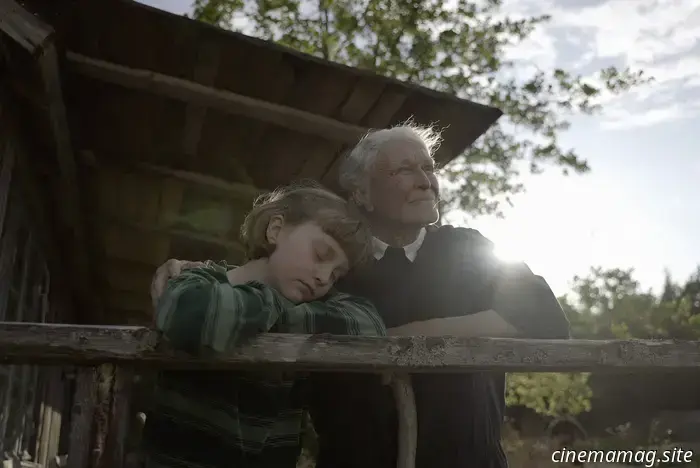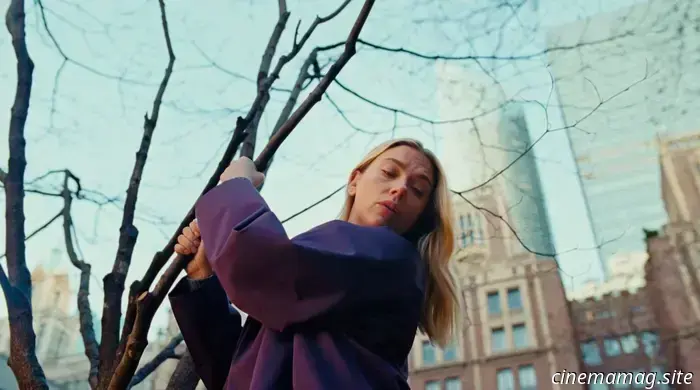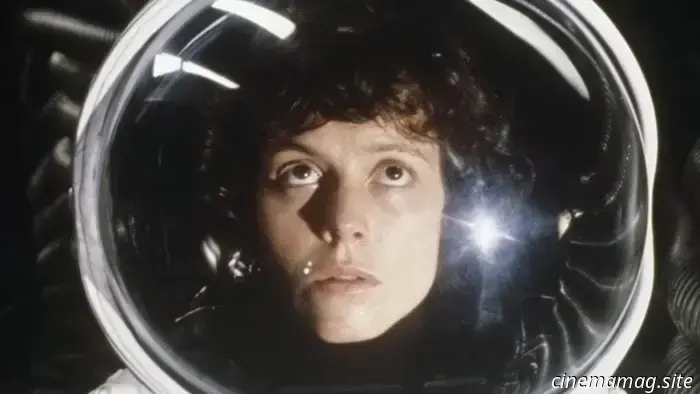
The Summer Book Review: An Awkward Drama Linking Nature and Spirit
Note: This review was initially published as part of our coverage of the 2024 BFI London Festival. The Summer Book will be released in theaters on September 19.
In Charlie McDowell’s previous film, Windfall, the ambitious—yet mostly unsuccessful—approach was to place the audience in a tense situation (similar to Hitchcock) and then quickly relieve that tension with a series of violent actions (akin to Tarantino). In contrast, his new film, The Summer Book, relies entirely on what could be termed “scenic exhalation”: those moments of stillness where a character gazes at a landscape while contemplating, ultimately revealing the bittersweet interconnectedness of all things. When utilized sparingly, this technique can be a powerful device that conveys profound lyricism (as seen in Tarkovsky’s The Sacrifice) and nuanced characterization (as in Mia Hansen-Løve’s Bergman Island). However, when overused—as it is in The Summer Book—the film begins to appear excessively tidy and idyllic, with the director's guiding influence becoming all too apparent.
As suggested by the earlier examples, scenic exhalation appears disproportionately in films set in northern Scandinavia, where the landscapes are relatively pristine, making them fertile ground for writers to weave in their collage of earth, air, fire, and that dubious fifth element: soul. This holds true for The Summer Book, which emotionally anchors itself in the stark Gulf of Finland. The story follows eight-year-old Sophia, her father (simply referred to as “Father”), and her grandmother (likewise called “Grandmother”), as they navigate the loss of Sophia’s mother, whose brief mention looms large throughout the film.
McDowell quickly establishes the film’s main premise: the emotional states of the characters mirror different aspects of the landscape. Sophia’s grandmother, who considers the current situation and her own imminent death in a broad, life-cycle perspective, is often linked to the sea and sky, the calmness of dawn, and sunlight filtering through trees (one scene in particular, where she wanders in a forest, seemingly echoes the final moments of Tarkovsky’s Mirror). Similarly, Sophia is drawn to the mix of forest trails and rocky cliffs, while her father is associated with the bleak gray skies and, later in the film, a sudden storm that threatens his boat—prompting him to shout what all beleaguered sailors must, “Is that all you’ve got?”
Throughout much of the film, we find ourselves pondering the same question. While Sophia and her grandmother are allowed to develop at a slow, conventional pace, her father is given little opportunity for depth. Until he has a dramatic storm scene, which acts as a trigger for a hasty transformation, he serves merely as a somber background character and the unfortunate recipient of McDowell’s most awkward visual metaphors—most notably a prolonged shot of a weathervane’s arrow appearing to penetrate his chest. The result of this underdeveloped yet suddenly over-extended role creates a sort of narrative whiplash, leading to an unintentional jarring shift in mood and behavior as the story rushes toward its predictable conclusion. This oversight is unfortunate, as Anders Danielsen Lie has demonstrated his talent as an actor when provided with strong material. He could have balanced Emily Matthews’ solid portrayal of the courageous yet vulnerable Sophia and perhaps restrained Glenn Close’s playful grandmother, whose monologues and cane-bearing antics occasionally border on overacting.
Nevertheless, the more playful exchanges between Sophia and her grandmother yield the best moments in The Summer Book, such as an excursion to a private island that plays out like a small action sequence, and a brief instance where the solitude of Sophia’s grandmother’s meditation is interrupted by the sound of Sophia clattering down some old stairs. However, despite these moments of charm and the emotional refuge each character finds in the other, The Summer Book ultimately feels too formulaic (an early “don’t-worry-it’s-nothing” cough sets the mood) and overly cautious about leaving the audience in the dark regarding the characters’ emotions (resulting in a symbolic overload). Ultimately, McDowell falls into the same trap that the somber Swede diligently avoided: revealing so much about the characters that we hardly get to know them at all.
The Summer Book made its debut at the BFI London Film Festival.
Grade: C
Other articles
 The trailer for the South Korean disaster thriller The Great Flood has been released.
Netflix has unveiled a trailer for The Great Flood, a South Korean sci-fi disaster thriller directed by Kim Byung-woo. The story follows An-na (played by Kim Da-mi), an AI researcher, and her young son Ja-in (portrayed by Kwon Eun-seong), as a devastating flood engulfs the world, confining them in their inundated apartment until she receives a message from a […]
The trailer for the South Korean disaster thriller The Great Flood has been released.
Netflix has unveiled a trailer for The Great Flood, a South Korean sci-fi disaster thriller directed by Kim Byung-woo. The story follows An-na (played by Kim Da-mi), an AI researcher, and her young son Ja-in (portrayed by Kwon Eun-seong), as a devastating flood engulfs the world, confining them in their inundated apartment until she receives a message from a […]
-Movie-Review.jpg) In Vitro (2025) - Film Review
In Vitro, 2025. Directed by Will Howarth and Tom McKeith, featuring Will Howarth, Talia Zucker, and Ashley Zukerman. SYNOPSIS: Set in the near future on a remote farm, cattle breeders Layla and Jack encounter a troubling entity on their land. In Vitro presents a chilling narrative within Australian cinema, addressing innovative farming methods and […]
In Vitro (2025) - Film Review
In Vitro, 2025. Directed by Will Howarth and Tom McKeith, featuring Will Howarth, Talia Zucker, and Ashley Zukerman. SYNOPSIS: Set in the near future on a remote farm, cattle breeders Layla and Jack encounter a troubling entity on their land. In Vitro presents a chilling narrative within Australian cinema, addressing innovative farming methods and […]
 Watch: Scarlett Johansson Discovers Rituals in Prada Advert Directed by Yorgos Lanthimos
For those who struggle to appreciate Yorgos Lanthimos's feature-length films lately, he might have discovered his perfect form of expression in (undoubtedly lucrative) commercials. His latest endeavor involves collaborating with Prada on a new advertisement featuring Scarlett Johansson, who has recently made her directorial debut with a feature film while also managing to find time for this project.
Watch: Scarlett Johansson Discovers Rituals in Prada Advert Directed by Yorgos Lanthimos
For those who struggle to appreciate Yorgos Lanthimos's feature-length films lately, he might have discovered his perfect form of expression in (undoubtedly lucrative) commercials. His latest endeavor involves collaborating with Prada on a new advertisement featuring Scarlett Johansson, who has recently made her directorial debut with a feature film while also managing to find time for this project.
 In the trailer for Stolen Girl, Kate Beckinsale searches for her daughter.
In anticipation of its debut next week, Voltage Pictures has unveiled a poster and trailer for James Kent's forthcoming thriller, Stolen Girl. Kate Beckinsale portrays Mara, a mother who collaborates with child abduction expert Robeson (Scott Eastwood) to locate her daughter, who has been taken by her ex-husband and has fled to the Middle East.
In the trailer for Stolen Girl, Kate Beckinsale searches for her daughter.
In anticipation of its debut next week, Voltage Pictures has unveiled a poster and trailer for James Kent's forthcoming thriller, Stolen Girl. Kate Beckinsale portrays Mara, a mother who collaborates with child abduction expert Robeson (Scott Eastwood) to locate her daughter, who has been taken by her ex-husband and has fled to the Middle East.
 12 Facts About the Alien Franchise That Might Surprise the Average Person
In celebration of FX's Alien: Earth, here are 12 intriguing facts about the Alien franchise that the average person might not be aware of.
12 Facts About the Alien Franchise That Might Surprise the Average Person
In celebration of FX's Alien: Earth, here are 12 intriguing facts about the Alien franchise that the average person might not be aware of.
The Summer Book Review: An Awkward Drama Linking Nature and Spirit
Note: This review was initially released as part of our coverage for the 2024 BFI London Film Festival. The Summer Book will hit theaters on September 19. In Charlie McDowell’s previous film, Windfall, the goal—albeit a mostly unsuccessful one—was to place the audience in a tense scenario (similar to Hitchcock's style) and then swiftly release that tension with a
